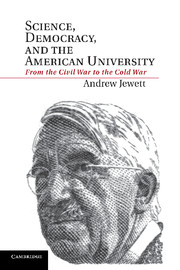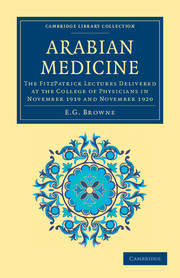Refine search
Actions for selected content:
10306 results in History of science: general interest
BJH volume 45 issue 4 Cover and Front matter
-
- Journal:
- The British Journal for the History of Science / Volume 45 / Issue 4 / December 2012
- Published online by Cambridge University Press:
- 21 January 2013, pp. f1-f2
- Print publication:
- December 2012
-
- Article
-
- You have access
- Export citation
Atoms for the people: the Atomic Scientists' Association, the British state and nuclear education in the Atom Train exhibition, 1947–1948
-
- Journal:
- The British Journal for the History of Science / Volume 45 / Issue 4 / December 2012
- Published online by Cambridge University Press:
- 21 January 2013, pp. 591-608
- Print publication:
- December 2012
-
- Article
- Export citation
Brian Regal, Searching for Sasquatch: Crackpots, Eggheads, and Cryptozoology. Basingstoke: Palgrave Macmillan, 2011. Pp. xi + 249. ISBN 978-0-2300-11147-9. £55.00 (hardback).
-
- Journal:
- The British Journal for the History of Science / Volume 45 / Issue 4 / December 2012
- Published online by Cambridge University Press:
- 21 January 2013, pp. 699-700
- Print publication:
- December 2012
-
- Article
- Export citation
Michael Bentley, The Life and Thought of Herbert Butterfield: History, Science and God. Cambridge: Cambridge University Press, 2011. Pp. xv + 381. ISBN 978-1-107-00397-2. £50.00 (hardback).
-
- Journal:
- The British Journal for the History of Science / Volume 45 / Issue 4 / December 2012
- Published online by Cambridge University Press:
- 21 January 2013, pp. 700-701
- Print publication:
- December 2012
-
- Article
- Export citation
Observations on observations
-
- Journal:
- The British Journal for the History of Science / Volume 45 / Issue 4 / December 2012
- Published online by Cambridge University Press:
- 21 January 2013, pp. 671-675
- Print publication:
- December 2012
-
- Article
- Export citation
Eden Medina, Cybernetic Revolutionaries: Technology and Politics in Allende's Chile. Cambridge, MA and London: MIT Press, 2011. Pp. xv + 326. ISBN 978-0-262-01649-0. £22.95 (hardback).
-
- Journal:
- The British Journal for the History of Science / Volume 45 / Issue 4 / December 2012
- Published online by Cambridge University Press:
- 21 January 2013, pp. 704-706
- Print publication:
- December 2012
-
- Article
- Export citation
Sadiah Qureshi, Peoples on Parade: Exhibitions, Empire, and Anthropology in Nineteenth-Century Britain. Chicago and London: The University of Chicago Press, 2011. Pp. vii + 382 ISBN 978-0-266-70096-0. £29.00 (hardback).
-
- Journal:
- The British Journal for the History of Science / Volume 45 / Issue 4 / December 2012
- Published online by Cambridge University Press:
- 21 January 2013, pp. 690-691
- Print publication:
- December 2012
-
- Article
- Export citation
Colin A. Russell and John A. Hudson, Early Railway Chemistry and Its Legacy. Cambridge: Royal Society of Chemistry, 2012. Pp. xiii + 193. ISBN 978-1-84973-326-7. £29.99 (paperback).
-
- Journal:
- The British Journal for the History of Science / Volume 45 / Issue 4 / December 2012
- Published online by Cambridge University Press:
- 21 January 2013, pp. 688-690
- Print publication:
- December 2012
-
- Article
- Export citation
Michael Sean Mahoney, Histories of Computing. Cambridge, MA and London: Harvard University Press, 2011. Pp. x + 250. ISBN 978-0-674-05568-1. £36.95 (hardback).
-
- Journal:
- The British Journal for the History of Science / Volume 45 / Issue 4 / December 2012
- Published online by Cambridge University Press:
- 21 January 2013, pp. 703-704
- Print publication:
- December 2012
-
- Article
- Export citation
Vera M. Kutzinski and Ottmar Ette (eds.), Alexander von Humboldt. Political Essay on the Island of Cuba: A Critical Edition. Chicago and London: The University of Chicago Press, 2011. Pp. xxvi + 519. ISBN 978-0-226-46568-5. £45.00 (hardback).
-
- Journal:
- The British Journal for the History of Science / Volume 45 / Issue 4 / December 2012
- Published online by Cambridge University Press:
- 21 January 2013, pp. 686-687
- Print publication:
- December 2012
-
- Article
- Export citation
Books received
-
- Journal:
- The British Journal for the History of Science / Volume 45 / Issue 4 / December 2012
- Published online by Cambridge University Press:
- 21 January 2013, pp. 711-713
- Print publication:
- December 2012
-
- Article
- Export citation
John Edward Fletcher, A Study of the Life and Works of Athanasius Kircher, ‘Germanus Incredibilis’. With a Selection of His Unpublished Correspondence and an Annotated Translation of His Autobiography. Leiden and Boston: Brill, 2011. Pp. xxxiv + 607. ISBN 978-90-04-20712-7. €184.00 (hardback).
-
- Journal:
- The British Journal for the History of Science / Volume 45 / Issue 4 / December 2012
- Published online by Cambridge University Press:
- 21 January 2013, pp. 683-685
- Print publication:
- December 2012
-
- Article
- Export citation
Books reviewed
-
- Journal:
- The British Journal for the History of Science / Volume 45 / Issue 4 / December 2012
- Published online by Cambridge University Press:
- 21 January 2013, pp. 717-719
- Print publication:
- December 2012
-
- Article
- Export citation
‘The monster’? The British popular press and nuclear culture, 1945–early 1960s
-
- Journal:
- The British Journal for the History of Science / Volume 45 / Issue 4 / December 2012
- Published online by Cambridge University Press:
- 21 January 2013, pp. 609-624
- Print publication:
- December 2012
-
- Article
- Export citation
Phillip. R. Sloan and Brandon Fogel (eds.), Creating a Physical Biology: The Three-Man Paper and Early Molecular Biology. Chicago and London: The University of Chicago Press, 2011. Pp. ix + 319. ISBN 978-0-226-76783-3. £22.50 (paperback).
-
- Journal:
- The British Journal for the History of Science / Volume 45 / Issue 4 / December 2012
- Published online by Cambridge University Press:
- 21 January 2013, pp. 694-695
- Print publication:
- December 2012
-
- Article
- Export citation
Margaret E. Derry, Art and Science in Breeding: Creating Better Chickens. Toronto, Buffalo and London: University of Toronto Press, 2012. Pp. viii + 281. ISBN 978-1-4426-4395-6. $65.00 (hardback).
-
- Journal:
- The British Journal for the History of Science / Volume 45 / Issue 4 / December 2012
- Published online by Cambridge University Press:
- 21 January 2013, pp. 695-697
- Print publication:
- December 2012
-
- Article
- Export citation
Index of authors
-
- Journal:
- The British Journal for the History of Science / Volume 45 / Issue 4 / December 2012
- Published online by Cambridge University Press:
- 21 January 2013, p. 715
- Print publication:
- December 2012
-
- Article
- Export citation

Science, Democracy, and the American University
- From the Civil War to the Cold War
-
- Published online:
- 05 November 2012
- Print publication:
- 29 October 2012
Research travel and disciplinary identities in the University of Cambridge, 1885–1955
-
- Journal:
- The British Journal for the History of Science / Volume 46 / Issue 2 / June 2013
- Published online by Cambridge University Press:
- 05 November 2012, pp. 255-286
- Print publication:
- June 2013
-
- Article
- Export citation

Arabian Medicine
- The FitzPatrick Lectures Delivered at the College of Physicians in November 1919 and November 1920
-
- Published online:
- 05 November 2012
- Print publication:
- 15 May 2011
- First published in:
- 1921
